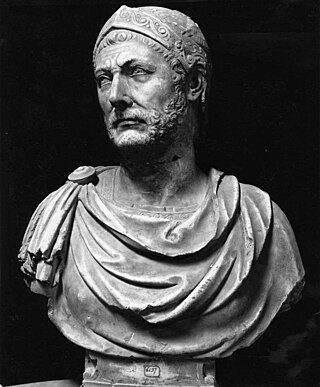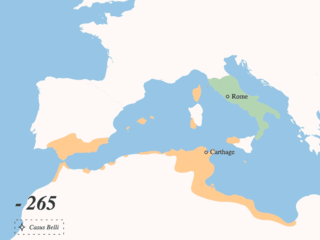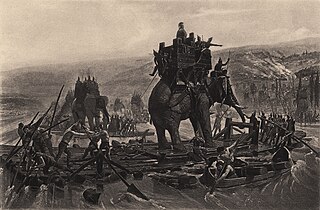
Hannibal was a Carthaginian general and statesman who commanded the forces of Carthage in their battle against the Roman Republic during the Second Punic War.

The Punic Wars were a series of wars between 264 and 146 BC fought between Rome and Carthage. Three conflicts between these states took place on both land and sea across the western Mediterranean region and involved a total of forty-three years of warfare. The Punic Wars are also considered to include the four-year-long revolt against Carthage which started in 241 BC. Each war involved immense materiel and human losses on both sides.

The Second Punic War was the second of three wars fought between Carthage and Rome, the two main powers of the western Mediterranean in the 3rd century BC. For 17 years the two states struggled for supremacy, primarily in Italy and Iberia, but also on the islands of Sicily and Sardinia and, towards the end of the war, in North Africa. After immense materiel and human losses on both sides, the Carthaginians were once again defeated. Macedonia, Syracuse and several Numidian kingdoms were drawn into the fighting, and Iberian and Gallic forces fought on both sides. There were three main military theatres during the war: Italy, where Hannibal defeated the Roman legions repeatedly, with occasional subsidiary campaigns in Sicily, Sardinia and Greece; Iberia, where Hasdrubal, a younger brother of Hannibal, defended the Carthaginian colonial cities with mixed success before moving into Italy; and Africa, where Rome finally won the war.

The 3rd century BC started the first day of 300 BC and ended the last day of 201 BC. It is considered part of the Classical Era, epoch, or historical period.
Year 202 BC was a year of the pre-Julian Roman calendar. At the time it was known as the Year of the Consulship of Geminus and Nero. The denomination 202 BC for this year has been used since the early medieval period, when the Anno Domini calendar era became the prevalent method in Europe for naming years.

This article concerns the 200 BC decade, that lasted from 209 BC to 200 BC.
This article concerns the period 259 BC – 250 BC.
This article concerns the period 239 BC – 230 BC.
This article concerns the period 219 BC – 210 BC.
This article concerns the period 189 BC – 180 BC.
This article concerns the period 199 BC – 190 BC.
Year 204 BC was a year of the pre-Julian Roman calendar. At the time it was known as the Year of the Consulship of Cethegus and Tuditanus. The denomination 204 BC for this year has been used since the early medieval period, when the Anno Domini calendar era became the prevalent method in Europe for naming years.
Year 203 BC was a year of the pre-Julian Roman calendar. At the time it was known as the Year of the Consulship of Caepio and Geminus. The denomination 203 BC for this year has been used since the early medieval period, when the Anno Domini calendar era became the prevalent method in Europe for naming years.
Year 205 BC was a year of the pre-Julian Roman calendar. At the time it was known as the Year of the Consulship of Scipio and Dives. The denomination 205 BC for this year has been used since the early medieval period, when the Anno Domini calendar era became the prevalent method in Europe for naming years.
Year 207 BC was a year of the pre-Julian Roman calendar. At the time it was known as the Year of the Consulship of Nero and Salinator. The denomination 207 BC for this year has been used since the early medieval period, when the Anno Domini calendar era became the prevalent method in Europe for naming years.
Year 195 BC was a year of the pre-Julian Roman calendar. At the time it was known as the Year of the Consulship of Flaccus and Cato. The denomination 195 BC for this year has been used since the early medieval period, when the Anno Domini calendar era became the prevalent method in Europe for naming years.
Year 188 BC was a year of the pre-Julian Roman calendar. At the time it was known as the Year of the Consulship of Messalla and Salinator. The denomination 188 BC for this year has been used since the early medieval period, when the Anno Domini calendar era became the prevalent method in Europe for naming years.
Year 214 BC was a year of the pre-Julian Roman calendar. At the time it was known as the Year of the Consulship of Verrucosus and Marcellus. The denomination 214 BC for this year has been used since the early medieval period, when the Anno Domini calendar era became the prevalent method in Europe for naming years.

Philip V was king of the ancient Greek kingdom of Macedon from 221 to 179 BC. Philip's reign was principally marked by the Social War in Greece and a struggle with the emerging power of the Roman Republic. He would lead Macedon against Rome in the First and Second Macedonian Wars. While he lost the latter, Philip later allied with Rome against Antiochus III in the Roman-Seleucid War. He died in 179 BC from illness after efforts to recover the military and economic condition of Macedonia and passed the throne onto his elder son, Perseus of Macedon.

Philopoemen was a skilled Greek general and statesman, who was Achaean strategos on eight occasions.







